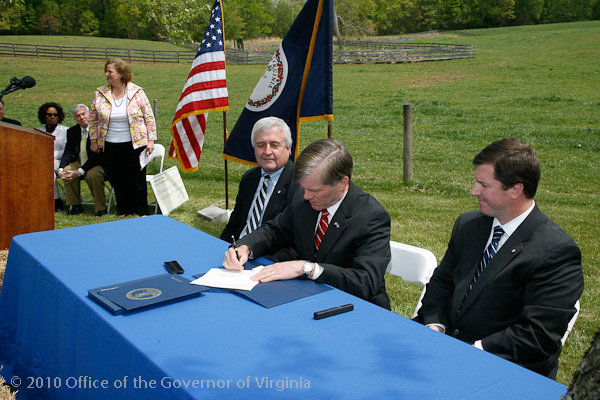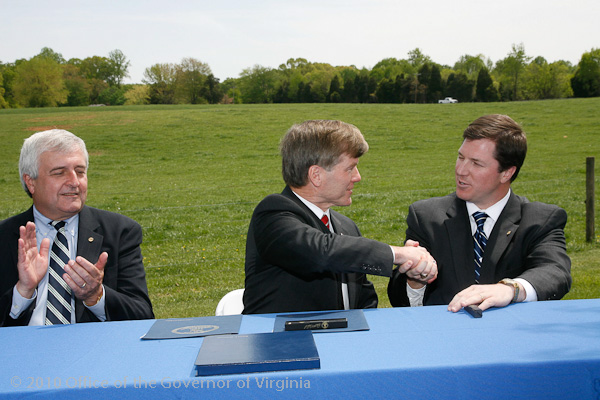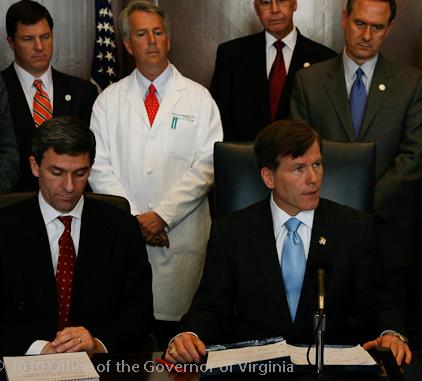-- Del. Peace Co-Patroned Domestic Energy Measure -
-- New Federal drilling policy beneficial to Virginia -
-- Policy can create jobs and generate revenue--
CENTRAL VA - In September of 2008, Congress lifted the federal moratoria on offshore exploration providing for a tremendous opportunity for the Commonwealth to begin investments that will reduce reliance on foreign sources of energy, while also helping to strengthen our economy. These opportunities met bi-partisan support during the 2010 General Assembly session. Passed by a vote of 69-28 in the House and 32-8 in the Senate, House Bill 787 was signed into law by Governor McDonnell on March 10 of this year. Delegate Christopher K. Peace (R-Hanover) was delighted to co-patron HB 787. Passage of this measure makes it the policy of the Commonwealth to support oil and natural gas exploration, development, and production 50 miles or more off of the coast of Virginia.
Prior to Session, Del. Peace wrote Ken Salazar, U.S. Secretary of the Interior, to support the development of energy resources off the coast of Virginia. The text of this letter is enclosed. A study by ICF International estimates that developing Virginia's offshore energy resources could result in nearly $19.5 billion in federal, state, and local government revenues. The collective pressure from Del. Peace and his colleagues has paid off. President Barrack Obama now plans to unveil new drilling policy today designed to create jobs and reduce the nation's addiction to foreign oil imports.
(Ref:) http://www.washingtonpost.com/wpdyn/content/article/2010/03/31/AR2010033104699.html
Delegate Peace contends, "The development of Virginia's offshore energy reserves would mean thousands of new jobs and hundreds of millions in tax revenue. It is vital in the economic times that legislators take steps to create jobs and implement revenue generating policies." "This action brings with it tremendous opportunity for our Commonwealth to begin investments that will reduce reliance on foreign sources of energy, while also helping to strengthen our economy."
A recent study on the issue, produced in 2005 by a professor at Old Dominion University, estimated that offshore natural gas production off of the Virginia coast would, over a 10-year period, likely create 2,578 new jobs, induce capital investment of $7.84 billion, yield $644 million in direct and indirect payroll, and result in $271 million in state and local taxes. The numbers were based on a conservative projection of the possible cubic feet of natural gas existing in the targeted area offshore.
Governor Bob McDonnell fulfilled one of his campaign pledges to help us move toward energy independence and create jobs to get our economy moving again by signing House Bill 787. Governor McDonnell also signed an additional energy measure into law. House Bill 756 will require that all revenues and royalties paid to the Commonwealth as a result of offshore natural gas and oil drilling be allocated as follows: 70 percent to the Transportation Trust Fund, 20 percent to the Virginia Coastal Energy Research Consortium, and 10 percent to localities for improvements to infrastructure and transportation.
TEXT OF LETTER FROM DEL. PEACE TO SECRETARY SALAZAR
December 14, 2009
The Honorable Ken Salazar
U.S. Secretary of the Interior
Department of the Interior
1849 C Street, NW
Washington, DC 20240
Dear Secretary Salazar:
As a Virginian and member of the House of Delegates, I would like to express my support for the development of energy resources off the coast of Virginia and the pending Sale 220 scheduled for 2011.
A study by ICF International estimates that developing Virginia's offshore energy resources could result in nearly $19.5 billion in federal, state, and local government revenues. In these challenging fiscal times, the economic impact of the Lease Sale cannot be downplayed. Delaying the opportunity for Virginians to benefit from the development of oil and natural gas resources would subsequently delay the opportunity to bring critical jobs to Virginia, and threaten the potential for future revenue sources.
Last year, I was pleased to see Congress lift the federal moratoria on offshore exploration. This action brings with it tremendous opportunity for our nation to begin investments that will reduce reliance on foreign sources of energy, while also helping to strengthen our economy.
I support the safe exploration of offshore energy resources, and urge your office to see Virginia Lease Sale 220 through on schedule.
Your consideration of my comments is greatly appreciated.
With kind regards,
Christopher K. Peace
Delegate Christopher K. Peace was elected to his third term representing the 97th District of the Virginia House of Delegates. The District includes parts of Hanover, Caroline, King William, King and Queen, Henrico, Spotsylvania Counties and all of New Kent County.
###





 The companion measure, Senate Bill 736 patroned by Senator Steve Newman (R-Lynchburg) passed by a vote of 25-15. HB 1389 and SB 736 are legislative initiatives contained in Governor Bob McDonnell’s “The Opportunity to Learn” Legislative Package.
The companion measure, Senate Bill 736 patroned by Senator Steve Newman (R-Lynchburg) passed by a vote of 25-15. HB 1389 and SB 736 are legislative initiatives contained in Governor Bob McDonnell’s “The Opportunity to Learn” Legislative Package.